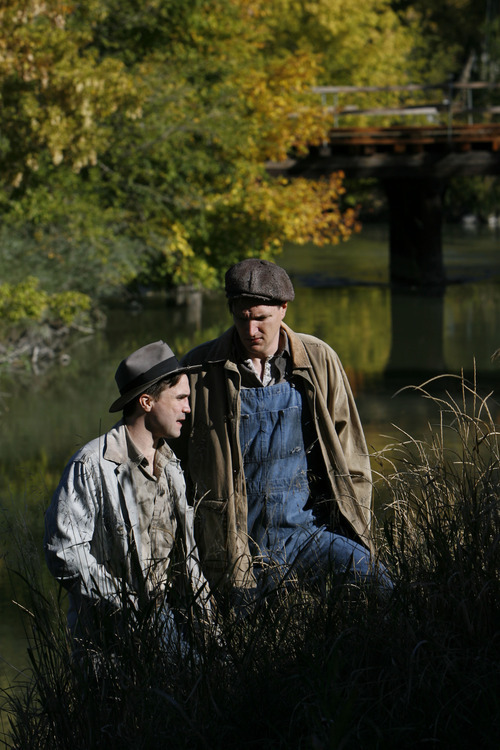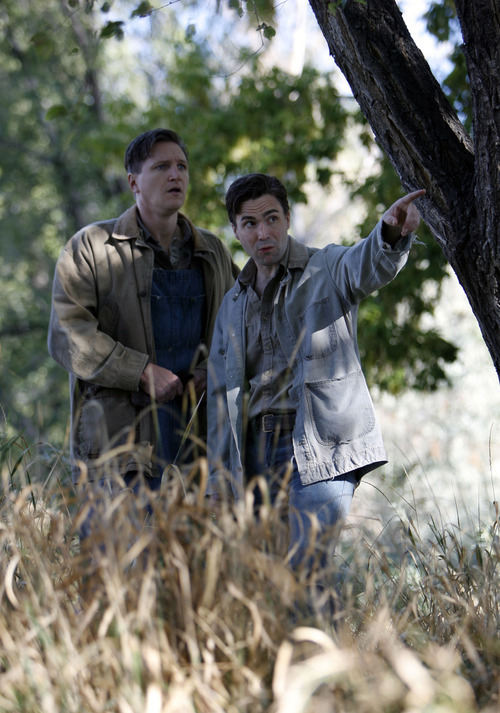This is an archived article that was published on sltrib.com in 2012, and information in the article may be outdated. It is provided only for personal research purposes and may not be reprinted.
John Steinbeck's Depression-era world is stark and spare, full of Dust Bowl refugees and migrant workers wandering across America, nourished by a dream of finding a home they can call their own.
One of his best-known works is "Of Mice and Men," the story of George and Lennie — two itinerant farmhands drifting from one California ranch to the next with hopes of making enough money to get their own place and "live off the fat of the land." Pioneer Theatre Company is currently giving the play a production that poignantly captures the yearning and loneliness of their workaday world.
George (Joe Tapper) and Lennie (Mark David Watson) are an odd couple. George is friendly, resourceful and hard working. He easily fits into anyplace he finds himself. Lennie is slow-witted and has the mind and spontaneity of a child fused with the body of a powerful man. His affinity for helpless animals and vulnerable people and desire to fondle anything soft are a volatile combination that continually causes trouble.
Different as they are, the two offer each other companionship in a harsh world where most people are cut off from each other. Lennie needs George to survive, and George finds Lennie an enthusiastic sounding board for reaffirming his dreams of a better life. As George says, "We got a future. We got someone to talk to."
Their arrival at a new ranch, where the hot-headed boss's son, Curley (Patrick Halley), has just married an attractive, desperately lonely young woman (Georgia Warner) seems destined to provoke conflict, although they also find support here from Slim (S. A. Rogers), a sympathetic mule skinner, and Candy (Bill Cwikowski), an aging worker who may possess the power to make their dreams a reality.
Director Mary B. Robinson and set designer James Noone have collaborated to keep the staging simple and direct to enhance the storytelling. Robinson has added descriptive narrations from the book to introduce both acts, and the actors provide jug band music to link scenes and change the basic wooden set pieces themselves. The stage is completely open, but Noone's backdrop — uneven layers of hanging white sheets — is totally enigmatic. Are they clouds? Mountains masked by heat? Clouds of dust? Because it's unclear, they are distracting.
Michael Gilliam creates warm little pools of light to relieve the characters' isolation, and K. L. Alberts' costumes are unassuming and workmanlike.
As George and Lennie, Tapper and Watson are a study in contrasts: Tapper animated and affable, and Watson self-conscious and impulsive. Watson has a way of slumping and letting his mouth go slack that lets us know exactly what Lennie is feeling, while Tapper adroitly juggles practicality and optimism.
Cwikowski's Candy is touching and talkative, and Rogers shapes a stalwart, compassionate Slim. Halley is cocky and bullying as Curley, and Warner makes his wife both sensual and naïve. When she and Lennie talk, they are like two innocents locked into their own dreams, speaking past, instead of with, each other. Sekou Laidlow's Crooks is embittered and disenfranchised, but still hopeful.
If anything, the need for community at the heart of "Of Mice and Men" is even stronger today than when Steinbeck wrote about it in the 1930s. We cannot survive without each other, and we would best take that message to heart. —
'Of Mice and Men'
Empathetic performances and straightforward staging capture the loneliness and longing of Steinbeck's American classic, "Of Mice and Men."
When • Reviewed Friday, Oct. 19; continues through Nov. 3; Monday-Thursday, 7:30 p.m.; Friday-Saturday, 8 p.m., with Saturday matinees at 2 p.m.
Where • Simmons Pioneer Memorial Theatre, 300 S. 1400 East, University of Utah campus, Salt Lake City
Tickets • $25-$44 (student discounts); at 801-581-6961; or http://www.pioneertheatre.org
Running time • Two and a half hours (including an intermission)

















